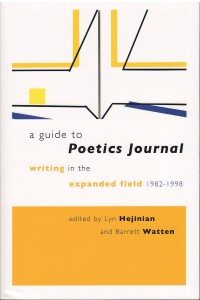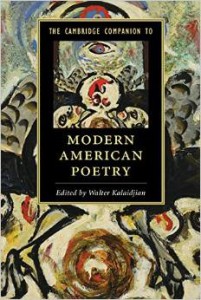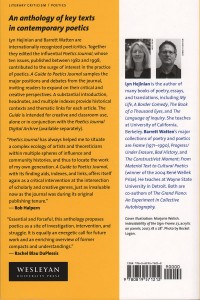A week ago, I returned from Germany to find the online poetry community in an uproar over Ron Silliman’s “Je suis Vanessa Place.” There, Silliman triangulates the Charlie Hebdo award controversy with the petition to remove Place from a steering committee at AWP, and her conceptual project to tweet Gone with the Wind in 140-character chunks over several years. Since then, a second letter campaign in part led to the devolution and canceling of the Berkeley Poetry Conference 2015 (BPC), a situation still unresolved. Silliman sees the primary issue as freedom of expression in a climate of projective and even rhetorically violent debate. Unfortunately, whatever the merits of his position—which I agree with on many grounds—his own rhetorical strategy makes analogies and leaps that are at turns defensive and projective to the point of offense to most readers. … More
Entries tagged with poetics
May 27, 2015
Document 36: Language Writing
“Language Writing”
an essay by Barrett Watten
The Cambridge Companion to
Modern American Poetry
ed. Walter Kalaidjian
Table of contents:
1. The emergence of ‘the new poetry’
John Timberman Newcomb
2. Modern American archives and scrapbook
modernism / Bartholomew Brinkman
3. Experimental modernism
Alan Golding
… More
August 15, 2013
Document 27: A Guide to Poetics Journal

A Guide to Poetics Journal:
Writing in the Expanded Field,
1982–1998
Ed. Lyn Hejinian and Barrett Watten
Wesleyan University Press, 2013
A Guide to Poetics Journal, the print component of a hybrid publication project that will be completed with its digital half, Poetics Journal Digital Archive, in early 2014, is now available from Wesleyan University Press. The press has provided a link that you may use to receive a 30% discount: use promotion code W301 at the following site: here. For more information on this venture, see the publicity flyer linked here.
Table of Contents
Lyn Hejinian and Barrett Watten
Introduction
Part I: Numbers 1–4
Steve Benson
Close Readings: Leavings and Cleavings
Charles Bernstein
Writing and Method
Beverly Dahlen
Forbidden Knowledge
Alan Davies
Language/Mind/Writing
May 15, 2013
Document 25: A Guide to Poetics Journal
An advance copy of A Guide to Poetics Journal: Writing in the Expanded Field, 1982-98 has just arrived. Orders may be placed now but will be fulfilled later (check here for updates on delivery). The entire project will not be “launched” until Fall 2013, when the companion Poetics Journal Digital Archive–which reprints nearly all of the 124 articles, 1600 published pages of the original journal in searchable, digital form–will be available. UPNE’s site for the anthology is here; a table of contents for the Guide may be found here. Click on either cover for a larger version.
January 7, 2013
Document 19: Books @MLA/Gloucester
[for Sarah Ruddy]
In lieu of a list of resolutions for the New Year, a bibliography of books acquired at the recent MLA in Boston and on a side trip to Gloucester may point toward some of its promises.
Modernism
Isherwood, Christopher. Goodbye to Berlin. New York: New Directions, 2012. New ed. in single volume.
Walser, Robert. The Assistant. Trans. Susan Bernofsky. New York: New Directions, 2007.
———. Microscripts. Trans. Susan Bernofsky. New York: New Directions/Christine Burgin, 2012.
Post-1945
Beckett, Samuel. Waiting for Godot/En attendant Godot: A Bilingual Edition. 1952/1953. New York: Grove Press, n.d.
Perec, Georges. La Boutique obscure: 124 Dreams. Trans. Daniel Levin Becker. Brooklyn: Melville House, 2012. Advance copy.
Modernity
Chang, Iris. The Rape of Nanking: The Forgotton Holocaust of World War II. 1997; New York: Basic Books, 2012.
June 28, 2012
Entry 15: Poetics of Failure
A resonant passage from Lyn Hejinian’s The Book of a Thousand Eyes, which should have wide circulation (and links) for pedagogical and moral purposes.
I am a failed fire chief
I am a failed thief
Didn’t I fail at the wrong thing, aren’t I a failure at failure
Failure is inevitable
I am a fan of failure
I am a failure flailed by failure
I leap into failure
I relish the self-pity that’s produced by the self-loathing that comes as a consequence of failure
The sauce has curdled, the meat is tough, the custard is runny—the meal is a failure
Failure is the offshoot of argument—but then failure occurs too from a lack of it
Moral failure
… More
April 3, 2011
Event 21: Cary Nelson Talks @ WSU
“Absolute Contingency: The Political Work of WWI Popular Poetry”
Thursday, April 14, 3:00 PM
The Welcome Center Auditorium
Woodward & Warren Avenues, WSU
“Honor & Solidarity: Can the Legacy of the Abraham Lincoln Brigade Inspire the Contemporary University’s Unions?”
Friday, April 15, 7:30 PM
The African-American Room, 91 Manoogian Hall
Warren Avenue & Anthony Wayne Drive, WSU
Flyer: click here
September 25, 2010
Entry 13: Jackson Mac Low as Reading Machine
“Jackson Mac Low as Reading Machine: Stanzas for Iris Lezak, Sampling, and Print Culture,” presented at High and Low, European Network for Avant-Garde and Modernist Studies, Adam Mickiewicz University, Poznan, Poland, 11 September 2010.
[From the introduction] In this paper, I propose a historical and cultural reading of postmodern practices of textual sampling and “reading through” in the poetry of Jackson Mac Low. To do so, I will position the methods and materials of his magnum opus Stanzas for Iris Lezak at the intersection of several concerns. The first is the imperative to rethink modernism and the historical avant-garde in relation to the content, forms, and media of mass culture. … More
May 1, 2010
Entry 12: Relational Poetics
post_moot 2KX / poetry + performance: a convocation
Miami University (Oxford, Ohio), 22–25 April 2010
Meetings, encounters, events, various types of collaboration between people, games, festivals, and places of conviviality, in a word all manner of encounter and relational intervention thus represent, today, aesthetic objects likely to be looked at as such, with pictures and sculptures regarded here merely as specific cases of a production of forms with something other than a simple aesthetic consumption in mind.
—Nicolas Bourriaud, Relational Aesthetics (les presses du réel, 2002), 28–29
Nicolas Bourriaud’s account of new forms of aesthetic practice is simple enough: after Pierre Bourdieu and Jacques Rancière, he identifies a range of “outer-directed” art practices that have emerged since the 90s in alternative venues. While originating in conceptual art, site-specific sculpture, installation, and performance from the 60s and 70s, these new forms translate the earlier ones into modes of social interaction. We are no longer speaking of “genre” per se, as with the position of painting and sculpture above. The aesthetic becomes the location of open interaction that connects artwork and community—to become a model, even instigator, of sociality. The open forms of formerly distinct genres—conceptual art, site-specific sculpture, installation, and performance—are further dismantled and recombined toward a horizon of social engagement as art practice.
February 11, 2010
Event 07: John Ashbery in Paris
“Ashbery’s Historicism: Regions of Modernity
in The Double Dream of Spring“
Workshop Session III, 14:30–17:00
Friday, 12 March 2010
John Ashbery in Paris: International Conference
11–13 March 2010
Institut Charles V, Université Paris Diderot
For the complete program, see:
http://johnashberyinparis.blogspot.com/2010/02/conference-programme.html














